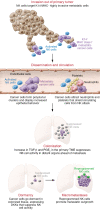The changing role of natural killer cells in cancer metastasis
- PMID: 35289318
- PMCID: PMC8920322
- DOI: 10.1172/JCI143762
The changing role of natural killer cells in cancer metastasis
Abstract
Natural killer (NK) cells are innate immune cells that are critical to the body's antitumor and antimetastatic defense. As such, novel therapies are being developed to utilize NK cells as part of a next generation of immunotherapies to treat patients with metastatic disease. Therefore, it is essential for us to examine how metastatic cancer cells and NK cells interact with each other throughout the metastatic cascade. In this Review, we highlight the recent body of work that has begun to answer these questions. We explore how the unique biology of cancer cells at each stage of metastasis alters fundamental NK cell biology, including how cancer cells can evade immunosurveillance and co-opt NK cells into cells that promote metastasis. We also discuss the translational potential of this knowledge.
Conflict of interest statement
Figures


Similar articles
-
Bench to bedside: NK cells and control of metastasis.Clin Immunol. 2017 Apr;177:50-59. doi: 10.1016/j.clim.2015.10.001. Epub 2015 Oct 23. Clin Immunol. 2017. PMID: 26476139 Review.
-
Natural Killer Cells: The Linchpin for Successful Cancer Immunotherapy.Front Immunol. 2021 Apr 28;12:679117. doi: 10.3389/fimmu.2021.679117. eCollection 2021. Front Immunol. 2021. PMID: 33995422 Free PMC article. Review.
-
The Natural Killer-Dendritic Cell Immune Axis in Anti-Cancer Immunity and Immunotherapy.Front Immunol. 2021 Feb 3;11:621254. doi: 10.3389/fimmu.2020.621254. eCollection 2020. Front Immunol. 2021. PMID: 33613552 Free PMC article. Review.
-
Chimeric antigen receptor (CAR)-modified natural killer cell-based immunotherapy and immunological synapse formation in cancer and HIV.Protein Cell. 2017 Dec;8(12):861-877. doi: 10.1007/s13238-017-0415-5. Epub 2017 May 9. Protein Cell. 2017. PMID: 28488245 Free PMC article. Review.
-
Natural killer cells and cancer therapy, what we know and where we are going.Immunotherapy. 2019 Oct;11(14):1231-1251. doi: 10.2217/imt-2019-0040. Epub 2019 Aug 19. Immunotherapy. 2019. PMID: 31422725 Review.
Cited by
-
Systems immunology insights into brain metastasis.Trends Immunol. 2024 Nov;45(11):903-916. doi: 10.1016/j.it.2024.09.010. Epub 2024 Oct 22. Trends Immunol. 2024. PMID: 39443266 Review.
-
Unlocking Glioblastoma Secrets: Natural Killer Cell Therapy against Cancer Stem Cells.Cancers (Basel). 2023 Dec 14;15(24):5836. doi: 10.3390/cancers15245836. Cancers (Basel). 2023. PMID: 38136381 Free PMC article. Review.
-
The tumor innate immune microenvironment in prostate cancer: an overview of soluble factors and cellular effectors.Explor Target Antitumor Ther. 2022;3(5):694-718. doi: 10.37349/etat.2022.00108. Epub 2022 Oct 31. Explor Target Antitumor Ther. 2022. PMID: 36338516 Free PMC article. Review.
-
Signaling Pathways Leading to mTOR Activation Downstream Cytokine Receptors in Lymphocytes in Health and Disease.Int J Mol Sci. 2023 Aug 13;24(16):12736. doi: 10.3390/ijms241612736. Int J Mol Sci. 2023. PMID: 37628917 Free PMC article. Review.
-
The Immunomodulatory Effect of Various Anaesthetic Practices in Patients Undergoing Gastric or Colon Cancer Surgery: A Systematic Review and Meta-Analysis of Randomized Clinical Trials.J Clin Med. 2023 Sep 18;12(18):6027. doi: 10.3390/jcm12186027. J Clin Med. 2023. PMID: 37762967 Free PMC article. Review.
References
Publication types
MeSH terms
Grants and funding
LinkOut - more resources
Full Text Sources
Other Literature Sources
Medical
Research Materials

